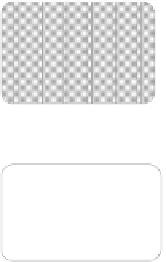Geoscience Reference
In-Depth Information
Complex Challenges for the Future
Complex Challenges for the Future
Problem Formulation
Hypothesis Generation
Needs Assessment
Technical Approaches
Problem Formulation
Hypothesis Generation
Needs Assessment
Technical Approaches
Analysis of Key Measures to Advance Knowledge
Analysis of Key Measures to Advance Knowledge
Knowledge
Environmental Fate
Impacts
Population Health
Exposure and Dose
Mechanism and Mode of Action
Implications
Costs
Feedback
Behaviors
Decision Options
Knowledge
Environmental Fate
Impacts
Population Health
Exposure and Dose
Mechanism and Mode of Action
Implications
Costs
Feedback
Behaviors
Decision Options
Data Acquisition
Ecologic
Biologic
Physical
Chemical
Epidemiologic
Socioeconomic
Behavioral
Informatics
Data Acquisition
Ecologic
Biologic
Physical
Chemical
Epidemiologic
Socioeconomic
Behavioral
Informatics
Data Modeling,
Analysis, and
Synthesis
Data Modeling,
Analysis, and
Synthesis
Outcomes
Balanced Informed Decisions
Improved Health
Cleaner Environment
Lower Costs
Outcomes
Balanced Informed Decisions
Improved Health
Cleaner Environment
Lower Costs
Systems Thinking to Assess Implications of Decisions
Applying Science that Anticipates, Innovates, Takes the Long View, Is Collaborative
Systems Thinking to Assess Implications of Decisions
Applying Science that Anticipates, Innovates, Takes the Long View, Is Collaborative
Translation and
Communication
Translation and
Communication
Systems Tools and Skills
Life-Cycle Assessment
Cumulative Risk Assessment
Social, Economic, Behavioral,
and Decision Sciences
Synthesis Research
Systems Tools and Skills
Life-Cycle Assessment
Cumulative Risk Assessment
Social, Economic, Behavioral,
and Decision Sciences
Synthesis Research
Synthesis and Evaluation
Sustainability Analysis
Solution-Oriented Approaches
Multiple-Criteria and
Multidimensional Tools
Uncertainty
Synthesis and Evaluation
Sustainability Analysis
Solution-Oriented Approaches
Multiple-Criteria and
Multidimensional Tools
Uncertainty
Applications, Decisions,
and Actions
Policy
Regulation
Social Change
Applications, Decisions,
and Actions
Policy
Regulation
Social Change
FIGURE 6-1
Framework for enhanced science for environmental protection. The iterative process starts with effective problem formulation, in
which policy goals and an orientation toward solutions help to determine scientific needs and the most appropriate methods. Data are acquired
as needed and synthesized to generate knowledge about key outcomes. This knowledge is incorporated into an array of systems tools and solu-
tions-orineted synthesis approaches to formulate policies that best improve public health and the environment while taking account of social
and economic impacts. Once science-informed actions have been implemented, outcome evaluation can help determine whether refinements to
any previous stages are required (see the dotted lines in the figure).










































































































































































































































































































































































































































































































































































































































































































































































































































































































































































































































































































































































































































































































































































































































































































































































































































































































































































































































































































































































































































































































































































































































































































































































































































































































































































































































































































































































































































































































































































































































































































































































































































































































































































































































































































































Search WWH ::

Custom Search